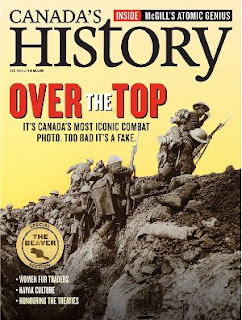Kate Jaimet, until recently senior editor at the magazine, interviewed Indigenous artists and curators from West Coast First Nations, and her article is a deep dive into the ways Catholic evangelization went hand in hand with Canada's war on the potlatch and Indigenous culture in general. "The masks represent not only art and history but a tangible connection to our ancestors and the ongoing efforts of our community to reclaim and protect its cultural legacy," she quotes Irwin Prince of the Quatsino First Nation."
Also: Dianne Dodds looks at the 1918 sinking of the Llandovery Castle by submarine action in 1918 -- the worst Canadian maritime disaster of the First World War, made more tragic by the deaths of 14 Canadian nursing sisters and many of their patients. The Llandovery Castle is in the news these days, with the recent publication of Nate Hendley's well-received book Atrocity on the Atlantic.
Elsewhere in the issue: a nice photo essay on the legacy of the one-room school across Canada, and Christopher Guly on Canada's movie history. The Canadian roots of a strange art theft. And news, reviews and more.
Plus -- in the reviews -- my review of Patrice Dutil's recent account of Canada's first federal election, Ballots and Brawls, from UBC Press. I'll be in the next issue too, with a feature timed to Remembrance Day.
Also of interest: the magazine's regular acknowledgement of all its donors and supporters. The list and the amounts donated are, well, immense -- great to see how strongly Canada's History is supported. Special callout to all my friends and colleagues whose names I spot on the lists! (Good to see Kate Jaimet got some funding from those donors to cover the costs of her extensive reporting on the potlatch masks story.)























